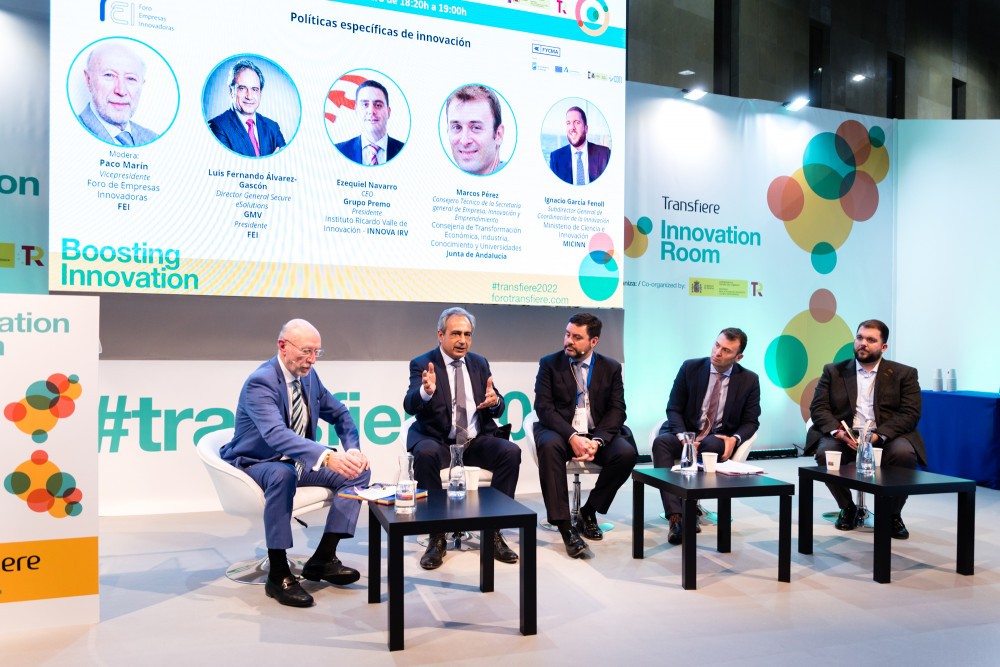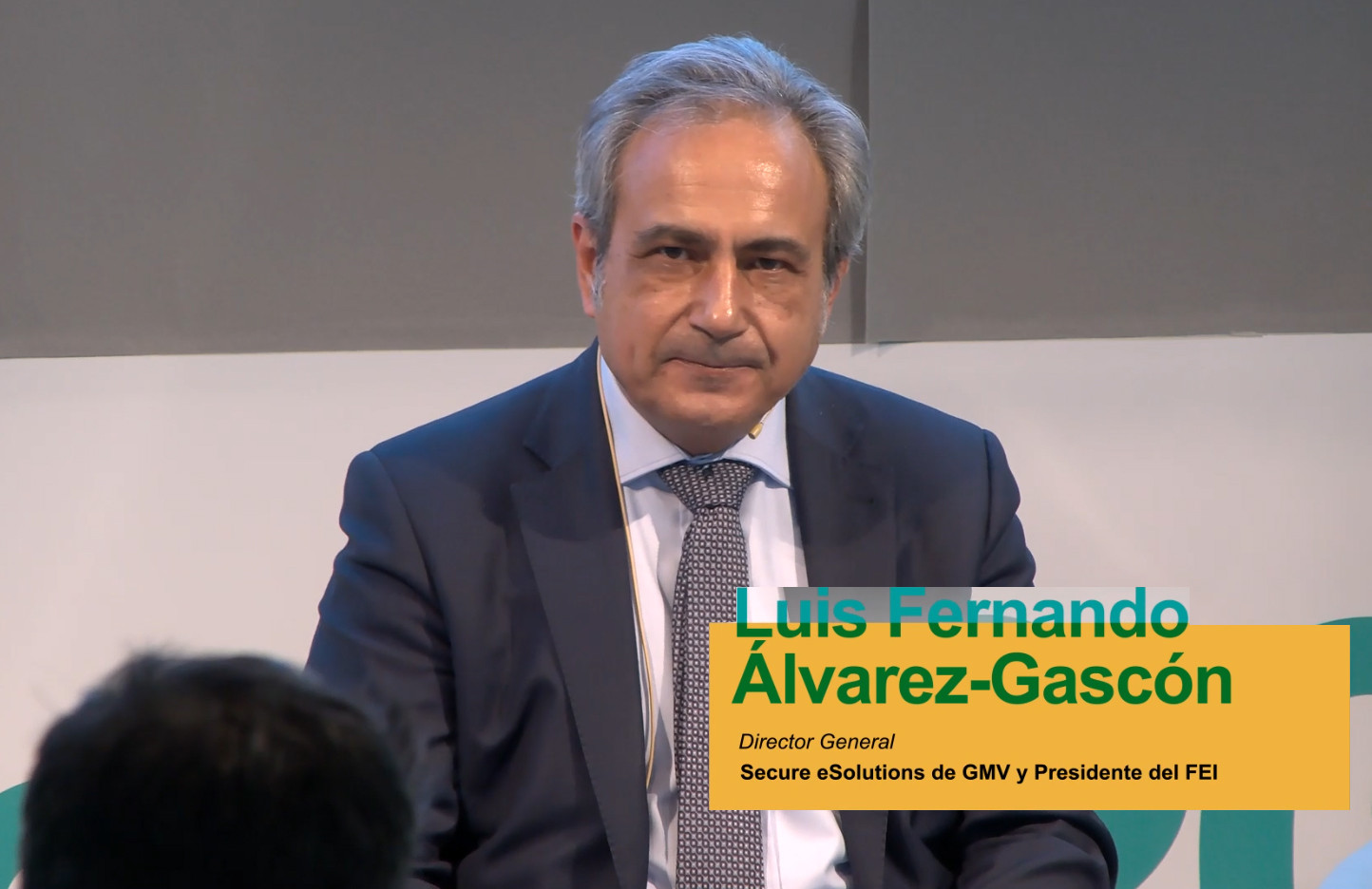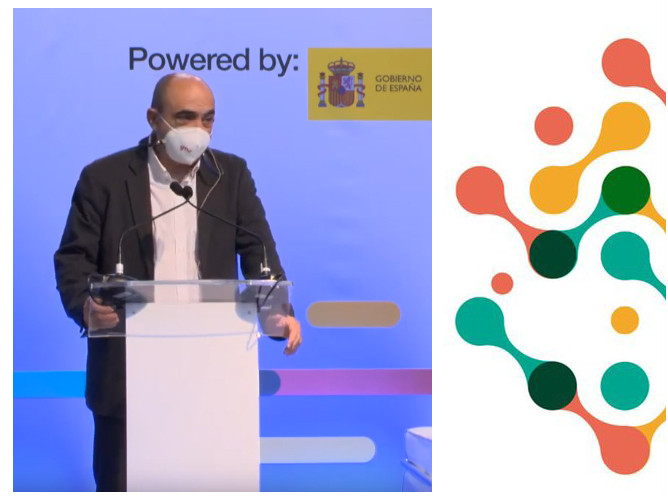GMV, a benchmark technology transfer company, in TRANSFIERE 2022

For yet another year GMV has taken part in the European Science, Technology and Innovation Forum TRANSFIERE, an event now in its eleventh year. It brings together the various players capable of raising Spain from its current 30th position in the World Intellectual Property Organization's ranking of innovating countries to a more honorable one in line with its actual capabilities.
Luis Fernando Álvarez-Gascón, general manager of GMV's Secure e-Solutions, and Miguel Ángel Molina, director of strategy and business development for GMV's Ground Segment and Space Operations area, represented the company, taking part in debates and specialized workshops. Luis Fernando Álvarez at a round table on Specific Innovation Policies, organized by the Innovative Businesses Forum (FEI), which he chairs. And Miguel Angel Molina, at the Boosting Zone workshops, at the discussion on access to international funding in Big Science and AeroEspacio.
Specific innovation policies
At the innovation table, moderated by Francisco Marín, the 2020 National Innovation Award winner and EIF member announced “the opening of a debate that will take up the next eight months, and to which experts from the innovation ecosystem will be invited. The aim is to envision, plan and detail the impacts of the changes that are crucial to improving Spain’s poor position in the ranking.” Ezequiel Navarro, CEO of the Premo Group and president of the Ricardo Valle Institute Foundation; Ignacio García Fenoll, Deputy Director General for Innovation Coordination, also participated in the meeting. Ministry of Science and Innovation (MICINN) and Marcos Pérez, Technical Advisor of the General Secretariat of Enterprise, Innovation and Entrepreneurship of the Ministry of Economic Transformation, Industry, Knowledge and Universities of the Regional Government of Andalusia.
In response to Marín's request to the panelists to come up with proposals to improve Spain's position in terms of innovation, Álvarez-Gascón proposed starting with “a change of perspective.” The problem "is poorly posed and we find ourselves unhappy and frustrated about it because we have been trying to improve this situation for a long time.” In Spain "the concept of R&D+i was invented and what in principle was something that was right on track, has perhaps led us astray when it comes to diagnosing it properly.” In fact, "it is innovation, which in our country we write with a small "i", which must be capitalized.”
Already in the first third of the 20th century, “the economist Schumpeter drew attention to a macro factor that explained economic growth at the micro level: What allows us to compete and have better salaries? Innovation.” Because, "we cannot do R&D+i and then see if we are able to transfer, we really have to reverse the terms.”
We cannot lose sight of the fact that "companies are the main actors, and for them to survive in the market while also remaining competitive, barriers to competition, among other things, must be eliminated, while the importance of the human factor and how it is trained must not be forgotten.”
Referring to the study group that is to come up with proposals for the State Plan 2024-2027, the moderator asked for suggestions on the conceptual approach it should have. In Álvarez-Gascón's opinion, we should first think about what sort of future we want for the country 10 years from now. In his view, “innovation should be decoupled from the entire R&D&I chain and removed from the domain of what have conventionally been considered R&D&I policies, where they are understood to fall under the clear, prominent and almost exclusive responsibility of a single ministry when it comes to execution.” Because innovation policies must be approached "holistically, they cannot be disconnected from industrial policy.”
In turn, the executive stated that "in this country, in 2030, there should be twice as many innovative companies, as measured by the INE survey, and private investment should be double the present level.”
He also emphasized that “innovative public procurement has great potential together with other mechanisms.” Although, sometimes “we fail to notice that when we subsidize an electric car, for example, from another geography, we are actually subsidizing the private purchase of innovation from other countries.” We should therefore “focus both the diagnosis and the instruments on our goal by means of a transformative policy: Innovation at the service of social objectives.”
Access to international funding in Big Science and Aerospace
For his part, Miguel Angel Molina participated in the initiative Boosting Zone, a series of workshops that Transfiere added to the program of the 2022 edition. It was an opportunity for regional authorities to share more closely their insight and experiences with other actors for Spanish innovation in academia and business.
Miguel Ángel Molina's presentation was given in the workshop "Access to international funding in Big Science and Aerospace".
He began by introducing the company, its origins and highlighting its first job designing space missions having won the first contract with the European Space Operations Center (ESOC) of the European Space Agency (ESA). He then went on to present the milestones in GMV's track record of more than 35 years.
Molina highlighted the two main areas in which GMV is working. First, the development of the ground segment of space missions. And, second, the space segment with the development of avionics subsystems and GNC systems for space missions. In both cases, he mentioned the most significant projects in which he is involved: Galileo, Copernicus, Hera, Oneweb, Exomars,...
Molina also highlighted GMV's leadership in research and development in the area of space robotics, both for orbital applications (in orbit servicing, in orbit assembly and active debris removal) and surface applications (robotic exploration).
Owing to its work on numerous ESA space programs and European Commission projects, including Galileo, GMV has become the sixth biggest employer and the top company in the MIDCAP segment.
During his presentation he pointed out that GMV's growth has been due to several factors, including the search for and recruitment of talent, proper investment in R&D, geographical diversification and the capacity to transfer its knowledge and technologies in the space field to other sectors such as defense, IT (cybersecurity) or transport.
Lastly, the workshop addressed significant issues related to the possibilities of public funding in the aerospace and scientific sectors. GMV gave its view and recommendations in this respect, stressing the importance of giving continuity to publicly-supported R&D+i investments and reinforcing them so as to make a similar contribution to Europe's GDP.
Furthermore, it stated that the space sector will continue to grow in the long term and both ESA and the European Commission will also follow this trend, with an European space programs expected to grow.

